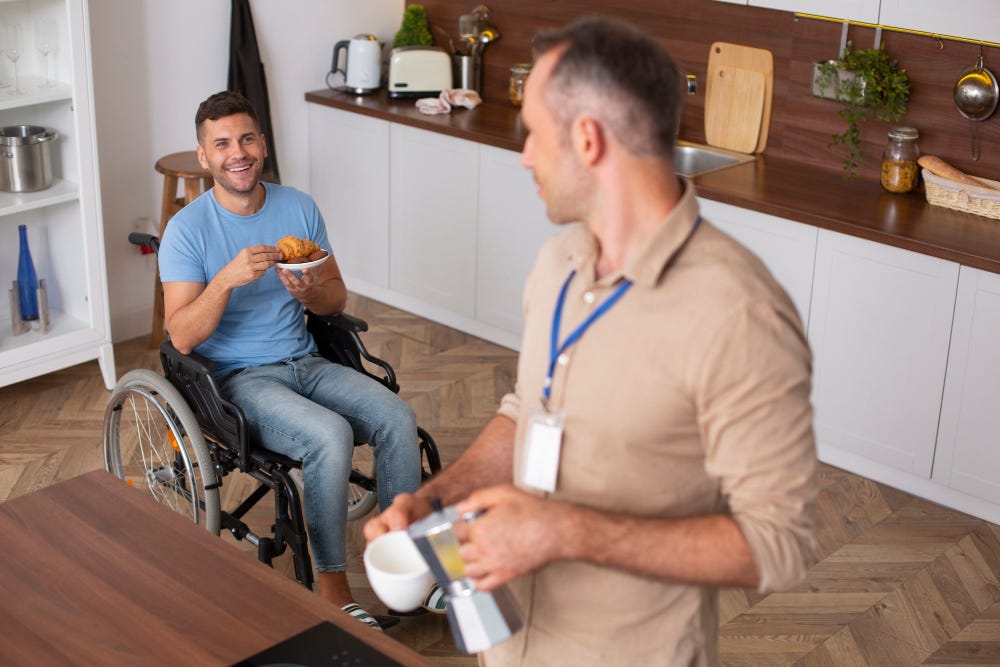Many people with disabilities want to be able to live independently because it means having freedom, autonomy, and the ability to make decisions about their own lives. This may have been a dream before but with NDIS now, it is possible to achieve that freedom to a large extent.
Do you or your loved one have a disability that hinders your daily life? Then, you must read this blog, where we illustrate the NDIS services in Melbourne that you can also capitalise on, ensuring greater freedom in life.
First things first—
Understanding Independent Living
Living on one’s own is only one aspect of independent living; it includes the capacity to direct day-to-day activities, make decisions, and fully engage in community life. However, individuals with disabilities frequently require a combination of supports to meet these needs. From personal care to community participation to transport, everything needs the support of a reliable caretaker, who happens to be a family member most of the time.
To offer significant support in this area, the Australian govt. has initiated the NDIS scheme, available across the nation. But even its participants rarely use it to its full potential. If you’re interested in knowing how to do it, read on.
How the NDIS Supports Independent Living
1. Personal Care and Support
The capacity to perform day-to-day activities like bathing, dressing, eating, and managing household chores is one of the fundamental components of independent living. So, the NDIS gives funding for its participants’ personal care services, which can be procured from any NDIS provider in Melbourne. The support staff from that particular provider will then come and assist you with your personal care, preserving participants’ dignity and independence.
2. Assistive Technology
Independence can be greatly improved with the help of assistive technology. So, the National Disability Insurance Scheme (NDIS) provides funding for a wide range of assistive technologies and devices, ranging from basic to advanced. For example:
- Shower chairs
- Grab bars
- Mobility scooters
- Communication devices
- Home automation systems
These technologies have the potential to significantly enhance quality of life by making it easier and safer for participants to conduct their tasks.
3. Home Modifications
Stairs, narrow entryways, or inaccessible bathrooms can pose challenges for people with disabilities. So, in most cases, changing the environment of one’s home is often necessary for independent living. This can incorporate introducing ramps, extending entryways, adjusting washrooms, and further developing kitchen openness.
If you so wish to make such changes in your home, you can get essential funding for them. This will allow you to lead your life more independently.
4. Support Coordination
Exploring the different supports and NDIS services in Melbourne can be a challenge. That is why NDIS also provides support coordination as a service to assist participants in comprehending their plans, establishing connections with service providers, and efficiently managing their support. This expert assistance will help you greatly in getting the results you want.
5. Community Participation
Being an active individual from the local area is a fundamental piece of autonomous living. To make this happen, NDIS also funds significant support in terms of community participation, like social exercises and sporting projects. This can support you in building social associations, seeking interests, and taking part in significant work, all of which add to a feeling of freedom and satisfaction.
Steps to Achieving Independent Living:
1. Set Your Objectives: Clearly outline what independent living means to you. Is it living on your own? Managing daily activities? Or participating in community events?
2. Make a comprehensive plan for the NDIS: Work with your NDIS service provider in Melbourne to foster an arrangement that mirrors your objectives and indicates the support you want.
3. Engage with NDIS Service Providers in Melbourne: Research and connect with high-quality service providers. Support coordinators can assist in finding suitable providers.
4. Utilise Assistive Technology: Explore and choose technologies that significantly impact your daily life, enhancing independence.
5. Adapt Your Living Environment: Make necessary home modifications to improve accessibility and safety, funded by the NDIS.
6. Build a Support Network: Establish a network of family, friends, support workers, and community groups to enhance your independence and reduce isolation.
7. Stay Informed and Advocate for Yourself: Regularly review your NDIS plan and advocate for adjustments as needed. Stay informed about updates to the NDIS.
8. Focus on Skill Development: Identify areas for skill improvement, such as cooking or budgeting, and utilize NDIS-funded training supports.
9. Embrace Community Participation: Engage in social, recreational, and employment activities to build relationships and enrich your life.
Conclusion
With NDIS, independent living is a practical and feasible goal to achieve. You can make it work by following the guide we just shared. If you need more in-depth information and help, you can talk to Empowering Care—a pioneering NDIS service provider in Melbourne. It can guide you adequately, ensuring you receive continued support in whatever manner you need. So, don’t hesitate to ring them up.



